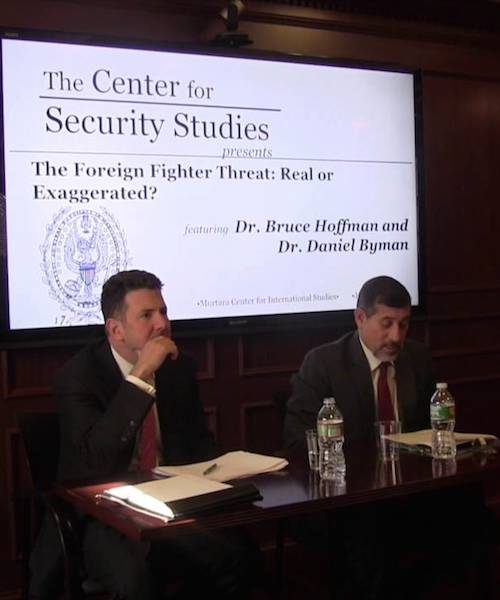The Radicalized Foreign Fighter Threat: Real or Imagined?

On January 14, two of the top experts in the field of terrorism, Georgetown professors Bruce Hoffman and Dan Byman, discussed one of the timeliest issues facing the international community: the threat of foreign fighters. The Center for Security Studies hosted the event, entitled “The Radicalized Foreign Fighter Threat: Real or Imagined?”
Hoffman began the discussion by noting, “While the threat of home-grown violent extremism, by either ISIS or Al-Qaeda inspired individuals, is largely accepted as a matter of fact, there’s surprisingly little consensus… on the potentially far greater danger of radicalized Western fighters returning to their countries of origin… to carry out terrorist attacks." Both professors agreed that the foreign fighter threat is assuredly a real one, though they disagreed on the question of ‘To what extent?’ Hoffman suggested that the ‘“boomerang effect” has “largely failed to materialize,” other than the most obvious cases such as the Paris attacks. This lack of materialization, to date, has understandably decreased the perceived potential threat, but he strongly urged us to “resist being lulled into this false sense of security.”
Both men cited a statistic that one in nine foreign fighters returns to their country of origin, which they agreed is terrifying. Hoffman noted that these returning fighters will likely be highly capable and therefore greater risks to their home countries. Byman, however, interjected that although they are capable in combat, these fighters will not necessarily be more capable in clandestine operations, which requires related but different sets of skills. He also noted that many who return home are likely disillusioned or traumatized by war and that psychologically, it is easier for an individual to wage war against a lesser known “murderous enemy” versus their home government.
The scholars had differing opinions on the scope of ISIS ambitions as well. Hoffman noted that their sheer focus on recruiting foreign fighters, at a level unseen before in history, is a major concern. Byman, mostly agreeing with this train of thought, added that the degree to which ISIS is focused on the West itself is more minimal, as compared to their focus on the regional expansion of the caliphate.
Another important point from Hoffman was that there is a very real threat in the current and potentially increased competition between ISIS and Al-Qaeda. An unknown but also significant threat is the potential amalgamation of the two groups, were one leader (Al-Baghdadi) to be killed in the near future.
The relative physical isolation of the United States from the region where ISIS is based, as well as strict refugee and immigration regulations, also decrease the probability of foreign fighters returning or coming to the United States via those channels. We should of course still be vigilant in protecting ourselves, but Byman asserted that we should only be “somewhat afraid.”
Although the threat is most definitely real, the way we are perceiving it is likely being influenced, at least in part, by media hype. To quote Byman: “What is a plausible, acceptable level of death from terrorism?... I don’t think your answer can plausibly be zero." Achieving zero casualties from terrorism, or even crime for that matter, is unrealistic and unsustainable by any government. We should assess our procedures and infrastructure helping to prevent terrorist attacks in the future, but we must not inflate one single threat and detract focus and resources from other areas as well. This links back to posts on the Global Futures blog about which issues are the most pertinent in the twenty-first century.
You can view the entire discussion between Hoffman and Byman, as well as the Q&A session following their comments, at the Georgetown Security Studies YouTube page. You can also read one of Hoffman’s most recent articles on the subject, mentioned at this event, in the National Interest: ISIS is Here: Return of the Jihadi.
Let us know your thoughts by joining the conversation on the Global Future of Security blog.
